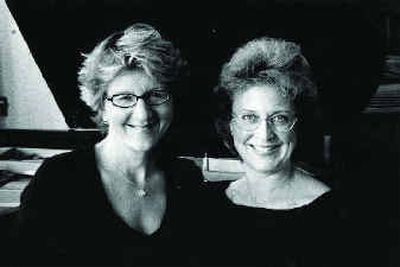Classical pianists make dynamic duo

Classical pianists Deborah Dewey and Lisa Bergman have known each other for nearly 20 years. They live not far from each other in Seattle. Both are performers and teachers, and they have served together on committees of various musical organizations.
Until two years ago, though, they had never played music together.
“We’d enjoyed each others company and admired each other’s work,” Dewey says, “so we decided that we would play some piano duets — four hands at one keyboard — just for the fun of it.
“When we came to the end of the first piece and played the last three chords exactly together, we laughed and said, ‘We couldn’t do that again in 1,000 years!’ But on the next piece we did it again.”
Two years and a whole series of concerts later, Dewey and Bergman, who call their team Ventidita (Twenty Fingers), will play a benefit concert Saturday at Westminster Congregational Church for the Crosswalk Program for Homeless Youth.
The duo will play works by Mozart, Rachmaninoff and Barber and will be joined by narrator Verne Windham in a performance of Saint-Saens’ “Carnival of the Animals” with verses by Ogden Nash.
Dewey grew up in Spokane, where she studied with the renowned piano teacher Margaret Ott, and later graduated from Wellesley College and Yale University. She teaches, gives lecture-recitals and raises two children aged 10 and 15.
Bergman grew up in Seattle and is a graduate of the University of Washington, the State University of New York at Stony Brook and the Juilliard School of Music. She teaches, is the artistic director of several music series including the Methow Music Festival and is a classical disc jockey.
“We were both trained as solo pianists,” Bergman says, “so we were both used to being alone at the keyboard. The very notion of sharing a keyboard, the way you have to in duet playing, seems very strange when all the sudden this ‘foreign body’ is present with four limbs — all of them in motion.”
“In some ways, the length of the piano keyboard seems meant for two players, but the reality is that it is a challenge to stay out of each other’s way,” Dewey says.
Adds Bergman: “There are some places where we must look like an octopus.”
Dewey and Bergman have solved part of what they call “the entanglement problem” by sitting on separate piano benches placed parallel to each other. Still, their musical scores are filled with markings warning how each is to keep out of the other’s way: “high” and “low,” or “in” and “out,” or, threateningly: “away!”
Another problem for any piano duet team is, who gets to control the sustaining pedal?
“Usually it is the player who plays the bass part,” Dewey says. “But when Lisa and I started playing together, I just instinctively took over the pedaling, and, amazingly, she liked it that way.”
“It’s like driving with cruise control,” Bergman says. “Well … really it’s more like driving with one person steering and the other’s foot on the gas pedal. It involves a lot of trust.”
Both Bergman and Dewey say that despite their years of solo playing and performing chamber music with singers or other instrumentalists, there is something special about two friends making music at the same keyboard.
“It’s become a passion, almost a need, for us,” Dewey says.
Adds Bergman: “Duet playing provides a thrill — a kind of synergy — that’s different from any other kind of music making. With piano duets there is an obvious physical collaboration that audience picks up on right away. When things go really, really well, everybody notices; it just sizzles!”